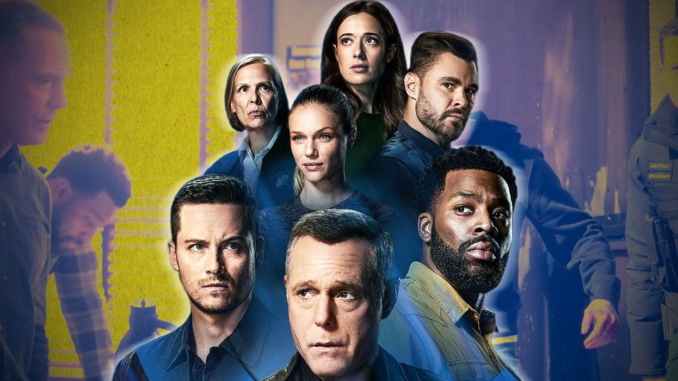
The Ever-Shifting Landscape of Intelligence: Change is the Only Constant
If there’s one thing that’s true in the gritty world of Chicago P.D.’s Intelligence Unit, it’s that change is inevitable. Just when you think you’ve got the team dynamic figured out, life throws a curveball – or in this case, a character departure – that forces everyone to adapt. It’s like trying to nail jelly to a wall, isn’t it? The team has seen its fair share of beloved members walk out the door, and each departure has left an indelible mark, reshaping the unit in profound ways.
The Early Days: Establishing the Foundation and the First Losses
Think back to the early seasons. The core team was a tight-knit group, a well-oiled machine under Voight’s sometimes questionable but always effective leadership. We saw the bonds form, the trust develop, and the unit become a family in its own unique, crime-fighting way. But even in those early days, the seeds of change were sown, with characters leaving and new faces arriving, subtly altering the team’s chemistry and operational style.
The Impact of Initial Departures on Team Dynamics and Investigations
Remember when [mention an early departing character and briefly their role, e.g., “Detective Jin’s departure early on, though perhaps less impactful than later exits, still created a void in the unit’s tech capabilities and forced others to step up.”]? Each early departure, no matter how big or small it seemed at the time, chipped away at the original structure, forcing the remaining members to adjust their roles and responsibilities. It was like a band losing a key musician – the sound changes, and everyone has to find a new rhythm.
The Gut-Punch Departures: Losing Pillars of the Intelligence Unit
Then came the departures that truly rocked the boat, the ones that left us reeling and wondering how the team would ever be the same. Losing key figures who were integral to the unit’s success and its emotional core had a seismic impact, forcing a fundamental re-evaluation of how the team operated and interacted.
The Loss of Olinsky: A Void That Could Never Truly Be Filled
Ah, Olinsky. The quiet, enigmatic veteran with a knack for getting the job done, no matter what it took. His departure [briefly explain the circumstances] left a gaping hole in the Intelligence Unit. He was more than just a detective; he was Voight’s confidante, the steady hand in the storm. Losing him was like losing the team’s anchor, and his absence was felt in every investigation, every tense standoff. You can’t just replace a guy like that, can you? He was one of a kind.
Halstead’s Exit: The End of an Era and a Shift in Leadership Dynamics
And then there was Halstead. The golden boy, the moral compass, the partner who often challenged Voight but always had his back. His departure [briefly explain the circumstances] marked the end of an era for the Intelligence Unit. He brought a certain idealism and a commitment to doing things by the book, even when the lines got blurry. His absence not only impacted his partnership with Upton but also shifted the leadership dynamic within the team. It was like losing the co-captain – the team had to find a new way to navigate.
The Ripple Effect: How Departures Changed Investigative Approaches
These significant departures didn’t just affect the team’s morale; they also had a tangible impact on how the Intelligence Unit approached their investigations. Different personalities bring different skills and perspectives to the table, and when those personalities leave, the team has to find new ways to solve crimes.
Adapting to New Skill Sets and Filling the Gaps
When a tech-savvy member leaves, someone else has to step up their game in the digital realm. When a master interrogator walks out the door, the remaining detectives have to hone their questioning techniques. It’s a constant process of adaptation, of identifying the gaps and finding new ways to fill them. It’s like a chameleon changing its colors to blend in with its surroundings – the team has to evolve to survive in the ever-changing landscape of law enforcement.
The Evolution of Interrogation Tactics and Field Operations
Think about how the interrogation room dynamics might have shifted after Olinsky’s departure. His subtle, often psychological approach was unique. Similarly, Halstead’s more by-the-book methods influenced how the team operated in the field. With their absence, we’ve likely seen a subtle but noticeable shift in how the unit gathers information and apprehends suspects.
The Arrival of New Blood: Injecting Fresh Perspectives and Energy
Of course, with every departure comes an opportunity for new beginnings. The arrival of new detectives and officers has injected fresh perspectives and energy into the Intelligence Unit, bringing new skills and dynamics to the team. It’s like planting new seeds in a garden – you never know what unique blossoms will emerge.
Exploring the Impact of New Characters on Team Chemistry
Each new member brings their own unique personality and background to the team, inevitably altering the existing chemistry. Some integrate seamlessly, while others create friction or unexpected alliances. It’s the push and pull of these new dynamics that keeps the team – and the show – interesting.
New Skills and Approaches Introduced by Recent Additions
Think about the specific skills and approaches that recent additions to the team have brought. Maybe a new detective has a background in cybercrime, or perhaps another has a knack for community policing and building trust. These new skill sets can significantly enhance the unit’s capabilities and open up new avenues for investigation.
Voight’s Leadership: Adapting to a Changing Team Dynamic
Throughout all these changes, one constant has remained: Hank Voight. But even Voight has had to adapt his leadership style in response to the evolving composition of his team. He’s had to learn to trust new faces, to delegate responsibilities differently, and to navigate the shifting personal dynamics within the unit.
Evolving Trust and Delegation within the Unit
Voight’s trust isn’t easily earned, but as new members prove their worth, we’ve seen him gradually extend that trust and delegate more significant responsibilities. This evolution in his leadership reflects the changing needs and capabilities of the team.
Maintaining Control While Fostering Growth in New Detectives
Voight still maintains a firm grip on his unit, but we’ve also seen him foster the growth of the newer detectives, allowing them to take on more challenging roles and develop their own instincts. It’s a delicate balancing act – maintaining control while nurturing the next generation of Intelligence officers.

The Enduring Core: What Remains Constant Despite the Changes
Despite all the departures and arrivals, the core essence of the Intelligence Unit remains. Their unwavering commitment to fighting crime, their fierce loyalty to one another (even when they’re bickering like siblings), and their determination to seek justice in the often-dark underbelly of Chicago are the threads that bind them together, no matter who comes and goes.
The Unbreakable Bond and Shared Mission of the Team
At the end of the day, they are a family, forged in the fires of countless investigations and shared dangers. That bond, that understanding that they have each other’s backs, is what allows them to persevere through the inevitable changes. Their shared mission to protect the city and bring criminals to justice remains their North Star.
Voight’s Unwavering Dedication to Justice, Regardless of Personnel
And through it all, Voight’s dedication to justice, his relentless pursuit of the truth, remains the unwavering force that guides the Intelligence Unit. While the faces around him may change, his commitment to cleaning up the streets of Chicago never wavers. He’s the rock upon which the team is built, adapting to the shifting sands but always standing firm in his pursuit of what’s right.
Looking Ahead: The Future of the Intelligence Unit and Potential New Transformations
As Chicago P.D. continues, we can undoubtedly expect more changes within the Intelligence Unit. That’s the nature of storytelling, isn’t it? Characters will come and go, new challenges will arise, and the team will continue to evolve. It’s this constant state of flux that keeps the show fresh and engaging.
Speculating on Future Departures and Arrivals
Who knows what the future holds? Will we see more beloved characters leave? Will new faces join the ranks, bringing their own unique skills and personalities to the mix? The possibilities are endless, and that’s part of what keeps us tuning in week after week.
How These Transformations Keep the Show Fresh and Engaging for Viewers
Ultimately, these character departures and arrivals serve a crucial purpose: they keep the show fresh and engaging. They force the writers to explore new storylines, develop existing characters in unexpected ways, and introduce new dynamics that keep viewers invested in the ever-evolving world of Chicago P.D.’s Intelligence Unit. It’s like a rollercoaster – the twists and turns are what make the ride exciting!
Conclusion:
The Intelligence Unit of Chicago P.D. has been a dynamic and ever-changing entity since its inception. The departure of key characters, while often heartbreaking for viewers, has served as a catalyst for significant transformations within the team. These changes have not only reshaped the unit’s investigative approaches and internal dynamics but have also paved the way for new characters and storylines that keep the show compelling. While we may miss the familiar faces of the past, the enduring spirit and unwavering dedication of the Intelligence Unit, led by the steadfast Voight, ensure that their pursuit of justice in the Windy City will continue to captivate audiences for years to come.
FAQs:
- Which character departure had the biggest impact on the Intelligence Unit? This is subjective, but many would argue that the departures of Olinsky and Halstead had particularly profound impacts due to their long tenure and significant roles within the team’s structure and emotional core.
- How has Voight’s leadership style evolved in response to the changing team dynamics? We’ve seen Voight gradually learn to trust and delegate more to newer members, while still maintaining his firm control and unwavering commitment to justice.
- Do character departures ultimately hurt or help the show in the long run? While losing beloved characters can be tough, these departures often create opportunities for new storylines and character development, which can ultimately keep the show fresh and engaging.
- Are there any signs of potential future departures from the current Intelligence Unit? As with any long-running show, the possibility of future character departures always looms. Only time will tell who might be the next to say goodbye.
- How do the writers balance honoring the legacy of departed characters with introducing and developing new ones? It’s a delicate balancing act. The writers often reference past characters and their impact while simultaneously focusing on building compelling storylines for the current team members.
